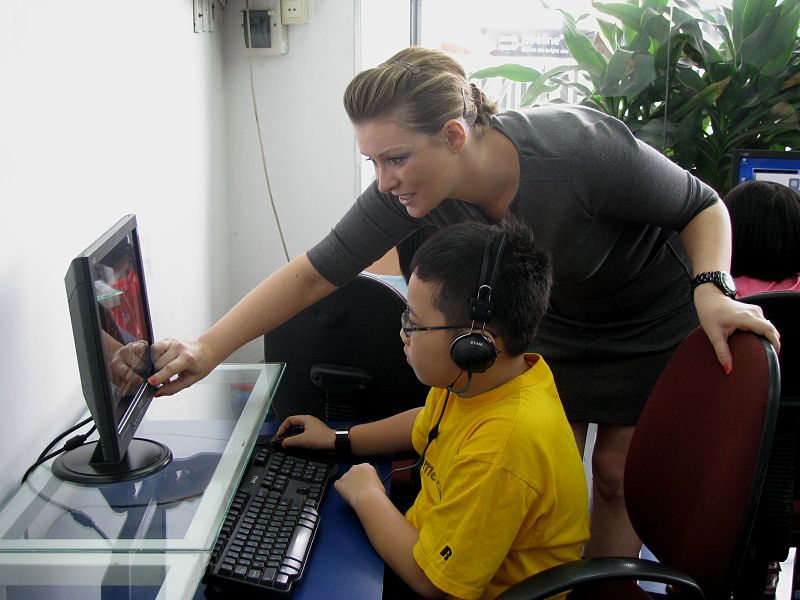Techy Tools for Teachers
19 Avril 2013 - 1:23pm
 Using technology, either as a historian or a teacher, can be wonderfully helpful or hugely frustrating. Everyone has stories about fighting with their word processor, or being unable to upload files as needed, or being confounded by glitchy USB keys. And while, despite these occasional setbacks, some of us embrace these new technologies for the benefits they offer, others remain passionately low-tech: pen and paper is still the note-taking method of choice for many colleagues of mine. But whether you’re a student or a teacher, it’s clear, our lives are becoming increasingly intertwined with new technologies.
Using technology, either as a historian or a teacher, can be wonderfully helpful or hugely frustrating. Everyone has stories about fighting with their word processor, or being unable to upload files as needed, or being confounded by glitchy USB keys. And while, despite these occasional setbacks, some of us embrace these new technologies for the benefits they offer, others remain passionately low-tech: pen and paper is still the note-taking method of choice for many colleagues of mine. But whether you’re a student or a teacher, it’s clear, our lives are becoming increasingly intertwined with new technologies.
In this post, I want to talk about a few different techy tools that have the potential to enhance your classroom activities. Here, I’m going to focus mostly on tools available for free online, not paid technologies like clickers (though here is a good article that assesses using clickers in the history classroom) or online courses like MOOCs (which you can learn about here). I want to share a few things history teachers could implement in their own classrooms to hopefully increase student engagement by presenting content through new media. As the digital humanities field increasingly expands, there are tons of new programs that can benefit history educators, and simultaneously show students a new appreciation for learning about the past.
Check them out, see what you think, and please feel free to post your own tips in the comments below!
Videos and Podcasts:
- Youtube is a great source for practically anything.
- There are endless fantastic podcasts, some devoted to history (a few examples include BBC Radio and the British Museum’s A History of the World in 100 Objects, the Library and Archives Canada podcast, and Nature’s Past) but also others that are a bit more general, such as This American Life, which has episodes that look at different aspects of history, such as Hitler’s yacht (maybe), two Cherokee women retracing the Trail of Tears, and the ghost of Bobby Dunbar. Explore podcasts on iTunes and you’ll definitely find something that fits your course curriculum.
Wikis
- A prof I know has students create or enhance Wikipedia entries on historical topics.
- Set up a wiki for your class, and then have students create entries on all the content for a specific course unit.
Visuals
- Google Earth can be really useful for helping students understand the geographical area you’re discussing.
- In a similar vein, check out the World Wonders Project, which could definitely help incorporate heritage site history into your classes.
- Asking your students to make timelines using Timeline Builder could be a great mini-assignment, or a good way to have them prepare for tests.
- A friend of mine, (@AndreaWalisser) has her students create twitter chats based on their reading of primary text documents. Asking them to rephrase the content while still keeping comments within the 140-character limit means they have a lot of fun, and probably come away with better comprehension of their significance.
- You could probably do something similar on Facebook, or ask them to create new profile pages for historical characters, using a template or The Wall Machine.
Administration
- There are a bunch of attendance apps you can download which will help you keep track of your students’ presence in class.
- I’ll admit that I still use Excel for keeping track of my grades, but another colleague of mine (@SarahAnn726) introduced me to Gradekeeper, a very easy-to-use program that helps you keep track of assignments. The demo is free, but again (sorry!) there is a cost, unless your school already has a license with them.
- There are also lots of great to-do list apps. My current fave is Any.Do, though some of my colleagues really like Teux Deux.
-
If you’re not on Dropbox already, try it out! Free file-sharing between your phone, laptop, and work computer.
Research
- The Scribe program is a great database software for you to build your own digital archive of research notes, book reviews, etc.
- Scribe also works with Zotero, a great research and citation management software (really, if you haven’t already, you should check out the Center for History and New Media, which produced both of those programs – lots of great content).
- Papers is a really great tool for organizing your pdfs. It’s got a great interface; think iTunes but for your research library. (Another exception: free trial demo only.)
What types of technology do you use to teach history?
Photo: "Teacher Appreciation", Wikipedia Commons, place unknown.
- Se connecter ou créer un compte pour soumettre des commentaires
Helpful post!
This post is realy helpful for teachers/researchers like me who aren't as up-to-date with using tech to do history. Thanks Madeline!
What's a tech trend you think is going to really take off in history classrooms?
Kate
- Se connecter ou créer un compte pour soumettre des commentaires

